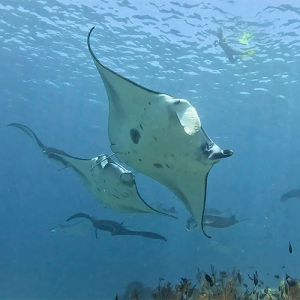Cameron Selkrig talks about his focus and perspectives after his first 40-days
Having completed his first 40-days as the new CEO of Spatial Vision, Cameron Selkrig is busy establishing a new way forward for the company and team. Read on to find out how he sees the next phase of Spatial Vision playing out and how he will leverage his leadership skills and experience to inform the company’s future.
Pictured right: Cameron (the snorkeler top right of the image 😉 ) sharing a special moment with a squadron of manta rays near Komodo in Indonesia, a moment he treasures.
Personal Background
Can you share a bit about your background and journey – what did you want to be when you grew up?
I grew up on a farm in northwest Victoria and like most kids, wanted to be a pilot when growing up!
I subsequently studied science and engineering at an undergraduate and postgraduate level, becoming a Chartered Engineer (ITEE and Systems Colleges) that specialised in satellite and information networks, before moving into management consulting and then executive roles.
Are there any personal or professional experiences that have significantly shaped your leadership style?
Fortunately, I had some great mentors and managers early in my career that gave me quite a lot of responsibility and the ability to make mistakes and learn from them constructively. There was naturally an expectation around reciprocating this trust and (of course) delivering results despite the challenges. I like to try to create the same environments for my teams.
Vision and Goals
What attracted you to Spatial Vision and this role?
Spatial Vision is interesting given its capabilities across technology, data and the provision of applications that are being used to support meaningful decisions every day. As for the role, it’s an opportunity to steward the organisation through its next phase of growth and meaningful impact. There is a strong base and many opportunities for us to explore.
What is your vision for the company over the next 5-10 years?
The Spatial Vision staff are uniquely positioned to contribute and limit the impact of climate change and reduce the biodiversity impacts that we are experiencing around the globe. Given these are global challenges, at Spatial Vision we need to carefully consider how we can have the greatest impact, and how we can structure to support this objective. This will include supporting both government and commercial businesses as they navigate climate change impacts – this is a distinct area where geospatial can add a great deal of value and Spatial Vision has a solid history that we plan to expand and develop.
What are the top priorities you plan to focus on in your first year as CEO? How do you plan to drive innovation within the company?
The primary focus of the first year is setting a strong foundation for growth through:
- Strengthening and building on our relationships with new and existing clients and stakeholders.
- Refinement of leadership roles, responsibilities, and delegations to ensure that decisions can be made at the most appropriate level to foster innovation and an entrepreneurial culture.
- Further build on the delivery teams to meet the competitive and changing market needs.
How do you plan to measure success in your role as CEO?
Through the team’s entrepreneurial pursuit of new and emerging opportunities where we can have an impact, having more diversity across the teams at all levels, and developing the future leaders of the business and industry.
What are you most excited about as you begin this new chapter with the company?
Working with some smart and passionate people and being part of their development journey.
Leadership Style
Can you provide an example of how you’ve successfully led organisational change in the past and what have you learnt?
There have been numerous technical, commercial, and organisational challenges that have required navigation over my career, and all situations have been very different. The most common theme has been driving change with people and supporting them as they navigate a different way of working. This process naturally requires building trust and providing transparency to all involved so they feel equipped and empowered to make the most appropriate changes to support our objectives.
What qualities do you believe are most important for a successful leader?
Being open to different points of view, transparent and constantly communicating.
Industry Insights
What do you see as the biggest challenges and opportunities in our industry today? What trends do you think will shape the future of our industry?
Across every technology-based industry, the barriers to entry have been lowered and the market is crowded with numerous software providers and product vendors. This is not unique to the geospatial industry.
At an enterprise level, the pain of clients has only increased. This includes the need to integrate data from various sources, increased analytical and processing needs, and navigating the ever-present pressure to do more with less. It continues to be a challenge for large organisations to keep abreast of and adapt to these changes as they are now less likely to hold operational budget for internal teams.
Increasingly governments and corporates are looking for independent and product agnostic partners that can provide impartial advice and services. Trust and values-alignment need to be present for the long term to ensure the best outcome and ultimately, the provision of fit-for-purpose solutions. This is Spatial Vision’s historical positioning and strength and will continue to be the case into the future.
How do you plan to position the company to take advantage of these opportunities?
Spatial Vision will continue to provide market leading geospatial services to its clients and seek to collaboratively innovate to solve their unique challenges. Assisting our client’s digital transformation with high quality and valued customer service will continue to be the norm of Spatial Vision.
As consumers and communities demand more from governments and suppliers, I have no doubt that the need for smarter, data-informed decisions and platforms will become our focus in collaboration with our clients. Climate change presents an unprecedented challenge for us all to navigate and given our history of collecting, analysing, and presenting climate-related data, I’m sure this will be the basis of our future growth and expansion.




